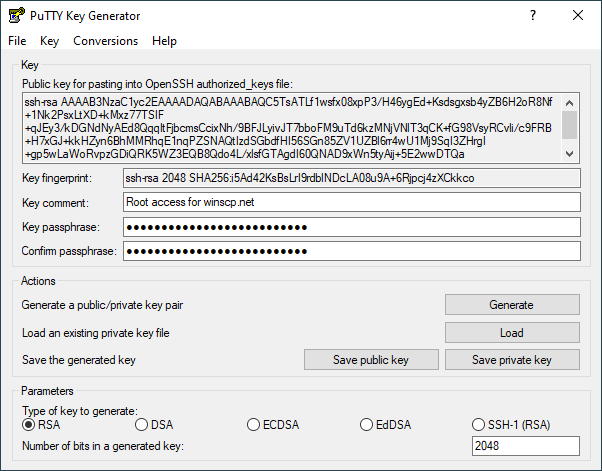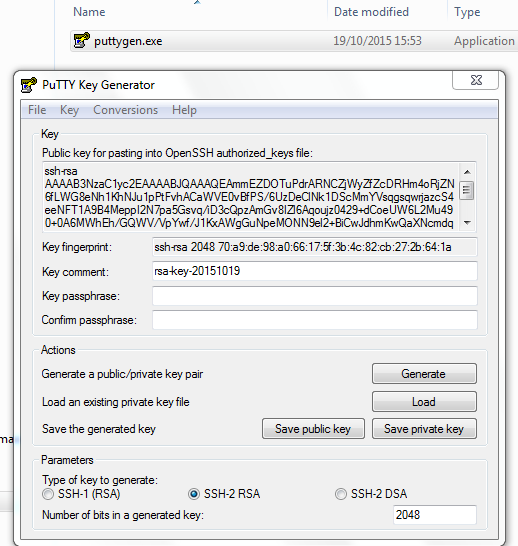With both Tectia SSH and OpenSSH servers, access to an account is granted by adding the public key to a /.ssh/authorizedkeys file on the server. To install the public key, Log into the server, edit the authorizedkeys file with your favorite editor, and cut-and-paste the public key output by the above command to the authorizedkeys file. Jan 02, 2020 Your public key should be copied at the appropriate folder on the remote server automatically. I have used /.ssh/idrsa.pub because that is the default location for the public ssh key. If you have it at some other location, you should use that in the above command. Method 2: Manually copy the public ssh key to the server. Run it on your local computer to generate a 2048-bit RSA key pair, which is fine for most uses. Ssh-keygen The utility prompts you to select a location for the keys. By default, the keys are stored in the /.ssh directory with the filenames idrsa for the private key and idrsa.pub for the public key. Apr 02, 2019 Installation of SSH Keys on Linux - A Step-By-Step Guide. Outlined below is a step-by-step guide detailing the process of installing SSH Keys on a Linux server: Step One: Creation of the RSA Key Pair. The first step in the installation process is to create the key pair on the client machine, which would, more often than not, be your own system. Creating an SSH key on Linux & macOS 1. Check for existing SSH keys. You should check for existing SSH keys on your local computer. You can use an existing SSH key with Bitbucket Server if you want, in which case you can go straight to either SSH user keys for personal use or SSH access keys for system use. Open a terminal and run the following.
The PuTTYgen program is part of PuTTY, an open source networking client for the Windows platform.
Generate Ssh2 Public Key Linux Free

Convert Ssh2 Key To Openssh
To generate an SSH key pair on Windows using the PuTTYgen program:

Generate Ssh2 Public Key Linux Download
- Download and install PuTTY or PuTTYgen.
To download PuTTY or PuTTYgen, go to http://www.putty.org/ and click the You can download PuTTY here link.
- Run the PuTTYgen program.
- Set the Type of key to generate option to SSH-2 RSA.
- In the Number of bits in a generated key box, enter 2048.
- Click Generate to generate a public/private key pair.
As the key is being generated, move the mouse around the blank area as directed.
- (Optional) Enter a passphrase for the private key in the Key passphrase box and reenter it in the Confirm passphrase box.
Note: Reimage pc repair license key generator.
While a passphrase is not required, you should specify one as a security measure to protect the private key from unauthorized use. When you specify a passphrase, a user must enter the passphrase every time the private key is used.
- Click Save private key to save the private key to a file. To adhere to file-naming conventions, you should give the private key file an extension of
.ppk (PuTTY private key).Note:
The
.ppk file extension indicates that the private key is in PuTTY's proprietary format. You must use a key of this format when using PuTTY as your SSH client. It cannot be used with other SSH client tools. Refer to the PuTTY documentation to convert a private key in this format to a different format.
- Select all of the characters in the Public key for pasting into OpenSSH authorized_keys file box.
Make sure you select all the characters, not just the ones you can see in the narrow window. If a scroll bar is next to the characters, you aren't seeing all the characters.
- Right-click somewhere in the selected text and select Copy from the menu.
- Open a text editor and paste the characters, just as you copied them. Start at the first character in the text editor, and do not insert any line breaks.
- Save the text file in the same folder where you saved the private key, using the
.pub extension to indicate that the file contains a public key. - If you or others are going to use an SSH client that requires the OpenSSH format for private keys (such as the
ssh utility on Linux), export the private key:- On the Conversions menu, choose Export OpenSSH key.
- Save the private key in OpenSSH format in the same folder where you saved the private key in
.ppk format, using an extension such as .openssh to indicate the file's content.

